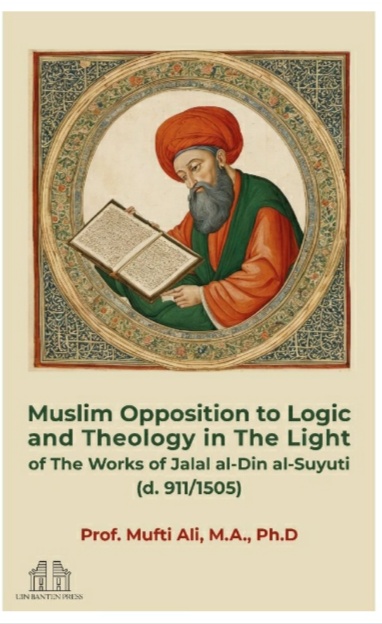By : Hairuzaman.
(Book Writer and Press Practitioner)
Title : Opposition to Logic and Theology in the Light of the Works of Jalāl al-Dīn al-Suyūṭī (d. 911/1505).
Author: Mufti Ali. Cover desaigner: Adi Nugraha. Layouter: Adi Nugraha. Number of pages: xi+251. Publisher: UIN Banten Press. Year of publication: 2023.
Several works of the Egyptian polymath, Jalāl al-Dīn al-Suyūṭī (d. 911/1505) invite us to take a fresh look at the much debated issues of the origins and status of theology and logic in Islam. As a staunch defender of the prophetic Sunna, al-Suyūṭī discussed these issues at several stages of his intellectual development. The result was a rich documentation of the history of the opposition to theology and logic in Islam, which deserves to be taken into account fully by modern scholars studying these issues.
Modern scholarship on the origin of Islamic theology can be divided into six views, respectively asserting: (1) the Hellenistic influence on the origin of Islamic theology; (2) Islamic theology mainly as the result of an internal development; (3) Christian influence on Islamic theology; (4) Jewish contributions to Islamic theology; (5) Persian features in Islamic theology; and (6) Indian elements in Islamic theology.
In addition to the origin of Islamic theology, modern scholarship also more specifically deals with the opposition to logic and theology. Goldziher, Madkour, Hartmann, al-Nashshar, al-Tabataba’i, Hallaq, Endress, Van Koningsveld, and Griffel have discussed the Islamic opposition to logic, while Makdisi, Daiber, Pavlin, Abrahamov, Juynboll and al-Hashshash have dealt with the Muslim opposition to theology (kalÁm) and the mutakallimÙn. The following passages will be devoted to discuss modern views on the origin of Islamic theology (1) and on the Islamic opposition to logic and theology (2). In the third section attention will be paid to al-Suyūṭī’s four works on these issues (3). On the basis of these discussions, we shall formulate our research question and explain the composition and the scope of the present study. *”



